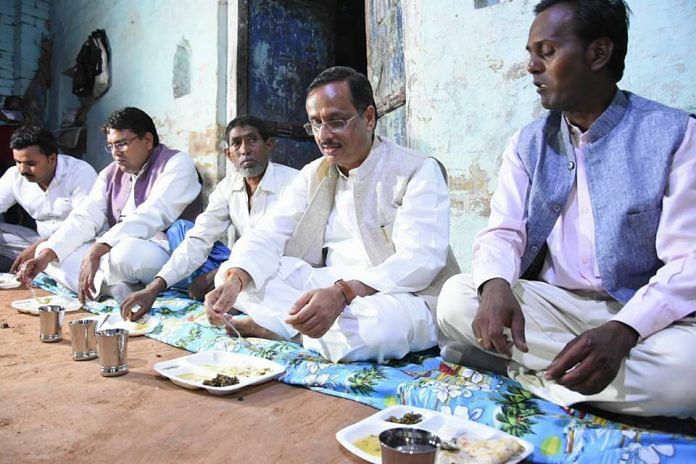Both Congress and BJP jostle it out to woo them, though quite crudely. They think that they will bag Dalit votes by this ‘dinner with Dalits’ approach.
Are the political parties, including the Congress and the BJP, clueless about how to win the Dalit support for their electoral prospects? Do they understand the psyche of the emerging new generation of Dalits? If so, how come one hears of clashes between the upper caste and Dalits so often? Una and Vemula incidents are classic examples in recent times.
‘Reaching out to Dalits’, seems to be a national political flavour now. The two big national parties — the Congress and the BJP — jostle it out to woo them, though quite crudely. They think that they will bag Dalit votes by this ‘dinner with Dalits’ approach and also appropriate the Dalit icon Ambedkar.
In the past, conflicts between Dalits and upper castes normally pertained to land, wages, water, housing and untouchability, but it is taking a new turn now with violence and intolerance. National Crime Records Bureau data shows that between 2007 and 2017, crime against Dalits increased by 66 per cent and the rape of Dalit women doubled. Dalit atrocities are reported often from the BJP-ruled states. There is also a shrill campaign by radical Hindu groups telling people what to eat and drink and how to dress.
The brewing Dalit rage reached its peak on 2 April, when they staged nationwide protests against the Modi government’s apathy in protecting their interests when the Supreme Court issued a controversial order on the SC/ST Act. The BJP is feeling the heat not only from its political opponents but also from within the party and its allies. Some BJP Dalit MPs have written to the Prime Minister pointing out that even after four years, the Modi government was paying only lip service. BJP lawmaker from UP Savitri Bai Phule, called it a “fake show”. Another BJP MP Udit Raj pointed out that just eating at Dalit homes would not satisfy them. Obviously, something is wrong in the BJP strategy.
One can’t fault the BJP for not making efforts. From nominating a Dalit as president to building monuments to Ambedkar, Modi had been trying to keep them on his side, as 24 per cent Dalits voted for the BJP 2014 elections. After Modi directed the ministers and party MPs to spend at least one night in one of the 20,000 identified villages where Dalit population is 50 per cent or more, several BJP ministers and chief ministers have visited Dalit homes in recent weeks.
Ironically, Anupama Jaiswal, a minister in the UP government had put the outreach efforts to a toss last week claiming, “ministers are paying several visits, even if mosquitoes bite them all night”. Another UP minister was caught ordering all the food, water and cutlery from outside when he visited a Dalit home for dinner.
The Dalit uprising has shocked the BJP and the RSS, as they had not anticipated the extent of their anger. With Dalits asserting their identity, the RSS efforts to transform Hindus into a homogeneous group might backfire. While the parent organisation has been talking about ‘one well, one temple and one crematorium’, gory incidents like Una have upset their plans. The RSS chief Mohan Bhagwat told a closed-door meeting recently that they should stop this drama. The dilemma for the BJP is this: it needs an intensive outreach campaign to woo Dalits, without alienating the core upper caste voters.
The BJP is not the only party, which has not understood the Dalit psyche. Meal with Dalit families for political gains was first popularised by Rahul Gandhi but since then it has become an established practice in all parties. He invoked Kalavati (a Dalit woman in Nagpur) in his Indo–US nuclear debate in 2008. The Congress has no big Dalit leader of the stature of Jagjivan Ram nor has it developed a second-rung credible leaders.
In a bid to woo them, the Congress is in the process of strengthening its SC cell and publicly taking up their cause. Rahul Gandhi has raised the issue in his recent Ramlila Maidan rally and elsewhere.
The impact of Dalit protests will be felt in Karnataka, Rajasthan, Madhya Pradesh and Chhattisgarh — the states where assembly elections are due this year. Dalits constitute 16.2 per cent of the population in Karnataka, 17.2 per cent in Rajasthan, 15.2 per cent in Madhya Pradesh, and 11.6 per cent in Chhattisgarh. No wonder, the Dalit atrocities have become an election issue.
The Dalits had their turn to attain political power when BSP chief Mayawati ruled UP four times but she is losing out now. Their big problem is that they are not homogeneous but they have proved that if they decide, they can be a swing force, as they showed in the recent UP bypolls. That is why the BSP and SP are planning alliance for the 2019 polls. Without Dalit unity, they cannot empower themselves nationally.
There are unmistakable signs that Dalits are getting tired of waiting for justice. They are not timid any more. The Dalit youth wants equality, dignity and justice and they want it soon. They want to claim their space in the system. The sooner the political parties realise this the better for them or else the Dalit uprising will continue.



